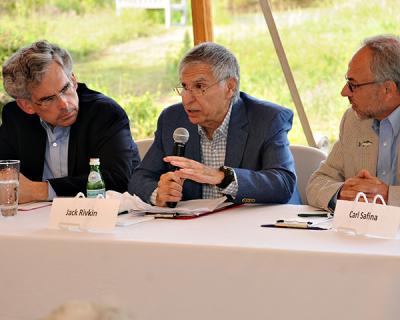Silver Lining In Grim Talk

Indications of climate change are all around us and civilization must adopt an aggressive timetable to “net-zero” energy in order to avert devastating environmental changes, according to panelists at the first of a planned series of events at the South Fork Natural History Museum in Bridgehampton, held on Saturday.
But with the crisis comes opportunity, they said. The path to net-zero energy — a term often used in the context of construction, meaning that energy consumed by a building is equal to the amount of renewable energy created on site — holds considerable upside in the form of government-issued rebates and other financial incentives.
“You can make money by taking advantage of what is going on,” said Jack Rivkin of Idealab, which invests in pioneering technologies including solar power and electric cars.
In response to audience questions, they also advised the gathering to retain and reuse water on their property, insulate their houses, eat less meat, fly less, abandon sport utility vehicles, support reform of federal flood insurance policy, divest from fossil-fuel interests, and “support rationality.”
Panelists, of varying backgrounds but united in their focus, repeated, with some irritation, that carbon-dioxide emissions trap heat in the atmosphere. This is scientific fact, they said. Mr. Rivkin was equally irritable in criticizing the “I’m not a scientist” mantra of Republican legislators in Congress and on the campaign trail who question or deny climate science. “It’s based on data, on scientists looking at data,” he said of climate-change predictions and evidence. “If we don’t do something about it, it could be very bad.”
Carl Safina, an ecologist and educator, asked, “If the climate were changing, what would be the evidence?” Melting glaciers, rising sea level, animals shifting their geographic range, intensified storms, and the acidification of the oceans was the answer. “In fact, we see all of those things,” he said. Mr. Safina pointed to oyster and scallop die-offs in the Pacific Northwest, which he blamed on rising ocean acidity, as well as the appearance of seaweeds in Antarctica, signs of marine life disappearing from their southern range, and eroded beaches.
Climate-change models predict large areas either under water or so drought-stricken that they are uninhabitable, said Michael Gerrard, an attorney and director of the Sabin Center for Climate Change Law at Columbia University. Sea level across Long Island may rise by 6 to 10 inches by the 2020s, and 15 to 30 inches by the 2050s, he said. Consequently, storm surges will be considerably higher, with far more serious flooding in storm events. “Past experience doesn’t fill me with optimism,” he said. “But the stakes are very high.”
The nonbinding agreement that emerged from the 2009 United Nations Climate Conference, in Copenhagen, to attempt to limit temperature increases to 2 degrees Celsius above preindustrial levels was inadequate at best, Mr. Gerrard said, given that “we are now on a trajectory of 5 or 6 degrees by 2100.” The U.N. climate conference to be held in December, in Paris, will produce similarly nonbinding, unenforceable agreements, he predicted.
“We’re looking at the possibility of pretty difficult changes, starting on the East End,” said Assemblyman Steve Englebright of New York’s Fourth District. Changes to agriculture, the water table, the coastline’s position, wildlife, and the frequency of extreme weather are in store, he said, adding that the Long Island Pine Barrens is threatened by the southern pine beetle.
Mr. Englebright told the gathering that all species would be impacted by long summers marked by extreme heat. “This is the model, and it’s playing out before us,” he said. “We’re going to need an informed public.”
While the discussion largely focused on dire forecasts, “solutions are the economic opportunity of our time,” said Peter Boyd, senior adviser and climate lead for the B Team, an organization that seeks to catalyze businesses to influence environmental, economic, and social change.
Mr. Boyd, who was launch director of the Carbon War Room, a nonprofit organization that works to advance a low-carbon economy, pointed to that group’s shipping efficiency initiative, which established a rating system for a majority of the world’s tankers, ferries, and container, cargo, and cruise ships — collectively, a huge emitter of fossil fuels — to enable anyone to discern between fuel-efficient and inefficient ships. The use of the latter is consequently declining, precluding significant CO2 emissions, he said.
“It’s not an impossible task,” Robby Stein, a member of the Sag Harbor Village Board and candidate for mayor, said of climate-change mitigation. “It’s very important that we start acting now.” On a local and individual level, “we have the ability to zero out and be a model” for other municipalities. Everyone, he said, should “communicate what we know through action.”
